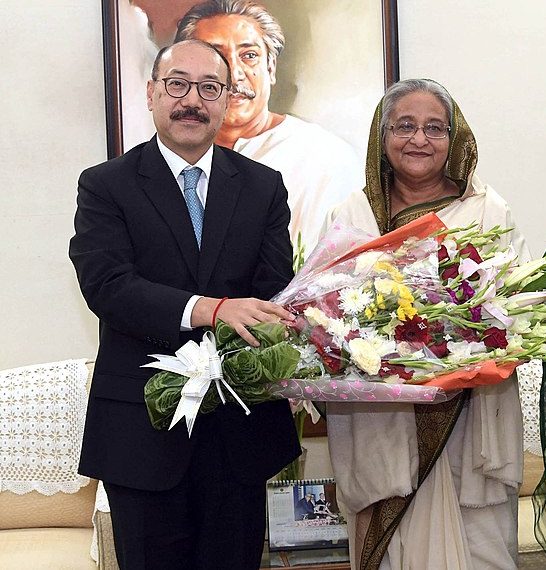In a sudden and short visit, Indian foreign affairs secretary, Harsh Vardhan Shringla met Bangladesh prime minister Sheikh Hasina with a message from Narendra Modi, prime minister of India. The visit has made everyone curious as for the first time in six months, the gates of Gonobhaban, the official residence of the Bangladesh prime minister, were opened for any foreign guest amid the novel coronavirus pandemic.
A secretary-level meeting was also held. Though both the countries have issued statements regarding the second meeting, neither have said anything about Shringla’s meeting with the prime minister. As a result, all sorts speculations have arisen about the visit.
It could be that there was nothing beyond the exchange of courtesies with the messenger. But several media reports say the courtesy call of Shringla to Bangladesh prime minister lasted almost for an hour, which suggests something was discussed. It was also seen in the past that the Bangladesh officials do not want to disclose these things and the local media, owing to some form of self-censorship, avoid digging deep.
The Indian envoys, on the contrary, speak to the media generously and their media also tries to find out the inside stories. This time was no exception either. The 132-year-old Indian newspaper, The Tribune, reported that Shringla discussed with prime minister Sheikh Hasina about “stepping up intelligence sharing, sharing of the COVID vaccine and a road map for Indian developmental assistance …. and the possibility of several projects being completed next year.”
The report further said, “The Indian side opted to play up the intelligence sharing angle in view of the dire situation of the Rohingya refugee camps in Bangladesh amidst reports that their poverty was a breeding ground for criminal activities as well as radicalisation.”
The Indian media outlet also said, “Given India’s sensitivity on Pakistan once again trying to revive its network, this time potentially through the Rohingyas, it was decided to hold a meeting between the two foreign ministers in the near future.”
Among the development projects, the newspaper report said, “Shringla also spoke on the … possibility of quickly completing some projects such as the Akhaura-Agartala rail link and the Khulna thermal plant.”
It also said the meetings discussed resuming air connectivity in a special arrangement and cargo shipment.
Another Indian media outlet, Zee News, said, “Bangladesh has proposed to India to hold the COVID-19 vaccine trial in the country, to which the Indian side has responded positively.”
The Zee News report further said, “Bangladesh is the second country after Bhutan which has offered to be part of COVID-19 trials.”
Currently, three vaccines are being developed in India — Oxford-Serum Institute, Bharat Biotech-Indian Council of Medical Research vaccine and Indian pharmaceuticals company Zydus Cadila.
Another Indian media outlet, scroll.in, however, said, “India had earlier this month persuaded Bangladesh to refuse an offer by China to conduct human trials of its COVID-19 (vaccine) on Bangladeshi citizens.” The report also said, “India has been conducting human trials of the Covaxin vaccine.”
From what the Bangladesh foreign secretary Masud Bin Momen said, it is clear that Bangladesh also wanted to take part in the trial of Indian vaccines.
We cannot disregard all the information the Indian media outlets published. It cannot be denied either that crimes and political situations centering around the Rohingya camps are gradually turning very complex. There are apprehensions of the involvement of various parties amidst the crisis of security and law and order situation in Cox’s Bazar that arose following the death of retired army major Sinha in police fire as the force turned desperate in the name of the anti-drug drive.
Foreign secretary, Masud Bin Momen however, said they have sought India’s help regarding the Rohingya crisis when the country is going to be a member of the United Nations Security Council. Until now, India has not voted in favor of Bangladesh in any international forum over the Rohingya issue.
In the same way, the question brought forth following the Indian media reports about COVID-19 vaccine is, why did the government not give any approval to human trial of the Chinese vaccine even in a month despite the preparation and Bangladesh Medical Research Council’s consent to it? Why should the participation in trial of Oxford’s vaccine will be dependent on India? Isn’t it a matter of partnership with Britain, Oxford and Astrazeneca? What did Bangladesh do to take part in the initiatives of other countries that are way ahead in production of COVID-19 vaccine before expressing its interest in joining human trial of vaccines being developed in India?
The Bangladesh government’s excitement during Shirngla’s visit was another noticeable thing. Foreign minister AK Abdul Momen termed the visit ‘very good news’. Was that excitement about offering special advantage to India in its vaccine diplomacy? Otherwise, what was there to be so excited over the visit of a messenger for the prime minister?
Regarding lessons from Nepal, Maldives and Sri Lanka, a few years ago, Happymon Jacob, professor of International relations at Jawaharlal Nehru University, Delhi wrote, “New Delhi should not behave like the modern-day Raj, and Indian diplomats appointed to these countries should stop thinking they are modern-day Viceroys!” (Losing the neighbourhood, The Hindu, 18 May 2016).
But Shringla’s visit raises the question, have we thought quite the reverse?
* Kamal Ahmed is a journalist based in Bangladesh.
August 21, 2020


